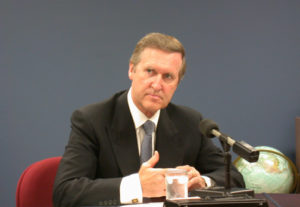In this tranquil setting it seems easier to postulate these global problems and imagine how we in Israel might deal with the issues in a more intelligent and sustainable manner.
One conclusion of any rational and scientific discussion is that cooperation and building interdependence is the key to both survival and prosperity. We are not alone in facing the issues of how to provide affordable clean water for our increasing population and ensure a reliable flow of energy to meet our growing economy. Cooperation among conflicting parties involved in water disputes increases access to water and lowers the risk of armed conflict over scarce resources.
Water and energy can be utilized as a catalyst for conflict resolution and for peace building. We can learn from other areas of the world and other periods in history where key commodities were used to build foundations on which peaceful relations between former enemies were advanced.
Perhaps the best example can be found in the European Coal and Steel Community (ECSC). This was the first treaty organization in Europe created after World War II that eventually led to what has become the European Union. The treaty was first proposed by Robert Schuman in 1950. In 1952, member nations of ECSC pledged to pool their coal and steel resources by providing a unified market for their coal and steel products, lifting restrictions on imports and exports and creating a unified labour market.
Economically, the Coal and Steel Community achieved early success; between 1952 and 1960 iron and steel production rose by 75% in the ECSC nations, and industrial production by 58%. When overproduction of coal became a problem after 1959, especially in Belgium, the ECSC demonstrated its flexibility by reducing Belgium s coal-producing capacity by 30% and making large sums of money available to aid in retraining miners and developing new industries.
THE PRESENT-day parallel to coal and steel is water and energy. Israel and Palestine share common surface water and underground aquifers. There is no just way to divide the common pool. The resource is simply too scarce to divide in a way that would be equitable and that could be used as a tool for building more peaceful relations in the future. Recent discoveries of large natural gas reserves in the waters off Gaza s shores provide the Palestinians with an opportunity to put some real assets on the negotiating table with Israel. Until now Israel has chosen to purchase natural gas from Egypt, by-passing the Palestinians out of fear that the exploitation of those resources by the Palestinians would provide them with too much cash that could be spent on armaments. Without Israeli readiness to use the Palestinian natural gas and with a depressed economy in Gaza, the economic feasibility and prospects of exploiting those reserves remain slim. As such, British Gas which was awarded the concession by the Palestinians, is very reluctant to develop those fields because there would not be a sufficient quantity of customers.
There is a clear win-win potential for both Israel and Palestine in advancing cooperation on both water and energy. Utilizing Palestinian gas would be economically beneficial to both sides in the development of additional desalination plants on the coast. Increased shares of fresh water would enable the sides to negotiate more equitable means of sharing the other water resources, as well as working together on the reuse of recycled waste water, increasing efficiency in agriculture and more.
The development of Gaza’s gas resources would have a direct impact on the economy of Gaza; this would facilitate greater and more positive trade relations between the two sides.
Both societies need to turn more attention to the need to conserve energy and optimize its use by introducing more efficient power plants and hybrid vehicles using petroleum and natural gas; and by developing more solar power and wind fields for generating electricity. There is no reason why borders and fences should remove possibilities for cooperation in areas that clearly serve mutual interests.
THE PALESTINIAN co-CEO of the Israel/Palestine Centre for Research and Information, Hanna Siniora, a visionary Palestinian leader, has suggested for the past several years that Israel and Palestine be the first in the world to develop a water and energy commission on the model of the coal and steel agreements of postwar Europe.
While Israel and Palestine have not quite reached the postwar period, advancing a mutually beneficial water and energy commission could be a pre-cursor to more peaceful relations between the two warring parties.
Peace is built by developing mutual interests and interdependence that make violence and conflict obsolete. For years we have been working on the premise that we must reach end of conflict agreements before we can pursue long-lasting alliances that both rely on and build interdependence. It is time to reexamine the axiomatic notion that real cooperation before full peace is not possible.



